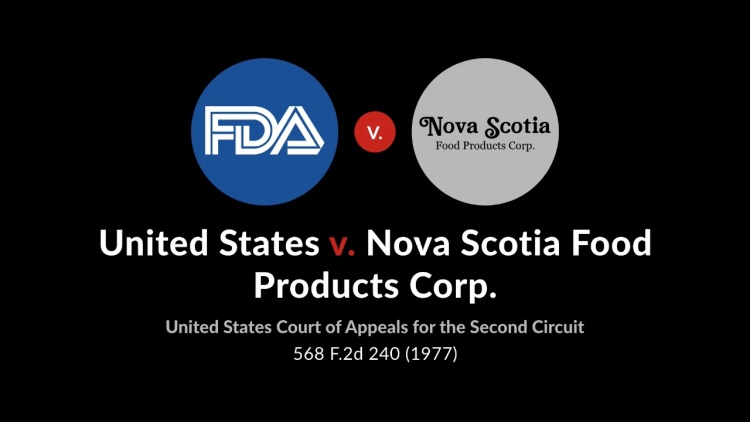United States v. Nova Scotia Food Products Corp.
United States Court of Appeals for the Second Circuit
568 F.2d 240 (1977)

- Written by Josh Lee, JD
Facts
The Food and Drug Administration (FDA) adopted regulations to address several cases of botulism that had been traced to consumption of fish taken from inland waters. These regulations imposed time-temperature-salinity (T-T-S) requirements on hot-process smoked fish and were adopted pursuant to informal notice-and-comment procedures. The initial rule required all brined fish containing 3.5 percent water-phase salt to be cooked to a temperature of 180 degrees for at least 30 minutes. The FDA did not disclose the scientific data that was relied on in establishing this standard. The FDA received comments from the fishing industry and the Bureau of Commercial Fisheries of the Department of the Interior objecting to the application of T-T-S requirements to all species of fish. Nova Scotia Food Products Corporation (Nova Scotia) (defendant) commented that the T-T-S requirements would completely destroy certain types of fish. The Bureau of Commercial Fisheries suggested the alternative of brining fish by reducing processing temperature and using higher concentrations of nitrite and salt. The FDA did not respond to these comments and adopted a slightly modified rule. After the rule was adopted, Nova Scotia was found by FDA inspectors to be in violation of T-T-S requirements for processing whitefish. Nova Scotia was given several warnings but continued to fail to comply with the T-T-S requirements. The federal government (plaintiff) sued Nova Scotia, seeking injunctive relief to prohibit Nova Scotia from processing hot-smoke whitefish except in compliance with T-T-S regulations. The district court granted the injunction, and Nova Scotia appealed to the United States Court of Appeals for the Second Circuit.
Rule of Law
Issue
Holding and Reasoning (Gurfein, J.)
What to do next…
Here's why 907,000 law students have relied on our case briefs:
- Written by law professors and practitioners, not other law students. 47,100 briefs, keyed to 996 casebooks. Top-notch customer support.
- The right amount of information, includes the facts, issues, rule of law, holding and reasoning, and any concurrences and dissents.
- Access in your classes, works on your mobile and tablet. Massive library of related video lessons and high quality multiple-choice questions.
- Easy to use, uniform format for every case brief. Written in plain English, not in legalese. Our briefs summarize and simplify; they don’t just repeat the court’s language.





